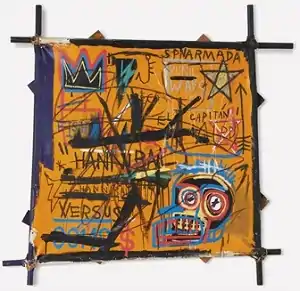Hannibal (1982 painting)
Hannibal is a painting created by American artist Jean-Michel Basquiat (1960–1988) in 1982. The artwork, which features his signature skull and crown motifs, was sold at Sotheby's for $13.1 million in October 2016.[1]
| Hannibal | |
|---|---|
 | |
| Artist | Jean-Michel Basquiat |
| Medium | Acrylic, oilstick and paper collage on canvas mounted on tied wooden supports |
| Movement | Neo-expressionism |
| Dimensions | 152.4 cm × 152.4 cm (60.0 in × 60.0 in) |
History
Jean-Michel Basquiat executed Hannibal in 1982, a breakout year in his meteoric career.[2] He had his first American one-man show at the Annina Nosei Gallery and he became the youngest artist to have ever participate in documenta in Kassel.[3] During this period, Basquiat began using roughly hewn canvas supports as seen with Hannibal. These stretchers were built by Basquiat's studio assistant, Stephen Torton. Basquiat had initially hired Torton to be a bouncer at his loft party, but by the end of the night he offered him the job of building stretchers. Basquiat's instructions could not have been simpler: "Just use whatever materials are here." Therefore, Torton constructed stretchers and frames out of found materials such as carpet tacks, rope, canvas, and wooden moldings.[4]
In May 1993, Hannibal was sold at Christie's New York for $79,500.[5] It was purchased for $1 million in 2004 by a Panamanian company called Broadening-Info Enterprises.[6]
In 2007, Hannibal was smuggled into the U.S. from by Brazilian financier Edemar Cid Ferreira.[6] Ferreira, founder and former president of Banco Santos, owned the painting. He was convicted of bank fraud, tax evasion, and money laundering in 2006.[6] As part of the case, a São Paulo judge ordered a search, seizure, and confiscation of assets that were acquired with illegally obtained funds from Banco Santos.[5] In 2007, the painting was shipped from the Netherlands to storage facility in the Upper East Side neighborhood of Manhattan.[7][8] Invoices failed to comply with U.S. customs laws—the item was not identified and it was labeled to be worth $100.[5] After extensive litigation, the painting was returned to Brazil in 2015.[5]
Hannibal drew zero bids when it was up for auction at Sotheby's New York in November 2015, however, it sold for $13.1 million when it appeared for sale at Sotheby's London in October 2016.[9]
Exhibitions
The painting has been exhibited at the following art institutions:
References
- Freeman, Nate (October 7, 2016). "Sotheby's Contemporary Sale Nets $59.6 M., Beating High Estimate, With $13.1 M. Basquiat Leading the Way". ARTnews. Retrieved 2021-01-18.
- Gotthardt, Alexxa (April 1, 2018). "What Makes 1982 Basquiat's Most Valuable Year". Artsy. Retrieved 2021-01-18.
- "21 Facts About Jean-Michel Basquiat". Sotheby's. June 21, 2019.
- Hoban, Phoebe (1998). Basquiat: A Quick Killing in Art. New York : Viking. p. 101. ISBN 978-0-670-85477-6.
- Kinsella, Eileen (June 19, 2015). "Bad Banker's $8 Million Basquiat Smuggled With Shipping Invoice for $100 Returns Home". artnet News. Retrieved 2021-01-18.
- Cohen, Patricia (May 13, 2013). "Valuable as Art, but Priceless as a Tool to Launder Money". The New York Times. ISSN 0362-4331. Retrieved 2021-01-18.
- Van Gelder, Lawrence (February 15, 2008). "Missing Basquiat Painting Found". The New York Times. ISSN 0362-4331. Retrieved 2021-01-18.
- "Missing Basquiat Art Reappears in NYC". New York Daily News. February 15, 2008. Retrieved 2021-01-18.
- Kazakina, Katya (October 7, 2016). "Comeback Kid Basquiat's Canvas Boosts $229 Million U.K. Auctions". Bloomberg. Retrieved 2021-01-18.
- Cantor, Judy (January 2, 1997). "The Revisitation". Miami New Times. Retrieved 2021-01-18.
- "Jean-Michel Basquiat, Hannibal". Sotheby's.